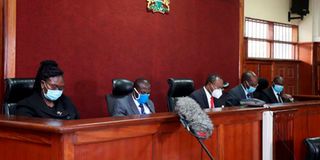Why success of BBI appeal is an uphill task

From left: Justices Teresia Matheka, George Odunga, Joel Ngugi, Jairus Ngaah and Chacha Mwita at the High Court in Milimani on May 13, 2021 when they delivered the judgement on BBI.
The Attorney-General, the Independent Electoral and Boundaries Commission (IEBC) and the Building Bridges Initiative (BBI) secretariat have filed their notices of appeal on the High Court judgment.
Though BBI supporters, and especially the Solicitor-General Ken Ogeto and BBI lead lawyer Paul Mwangi, have insisted that their appeals will be successful, I believe it will be an uphill task for the appellants to make any meaningful dent to the High Court judgment.
What winning looks like
A meaningful court win for BBI and its promoters is one that allows the amendments to go to a referendum. What then would the appellants need to do to get this outcome? To begin with, the High Court was presented with 17 issues to determine. After determining those issues, the court made 18 declarations against the BBI constitutional amendment process.
The court also made one substantive order against BBI – that is, an order permanently stopping IEBC from undertaking any process that would advance the BBI bill. That includes any process relating to planning or holding a referendum on BBI bill.
Each of the 18 declarations is separately sufficient to support the final High Court order that IEBC should not hold BBI referendum. This means that for the appellants to succeed at convincing the Court of Appeal that the BBI referendum should be permitted, they must prove the High Court was wrong on all the 18 declarations it made. If, for example, the appellants were successful at reversing 17 out of the 18 declarations, BBI referendum would still not be greenlighted.
An example here would help. Declaration number 14 states that the section of BBI bill that allocated 70 constituencies is unconstitutional because that is a constitutional duty of the IEBC. Even if the appellants convinced the Court of Appeal on all the other issues but were unsuccessful on declaration number 14, it means that BBI bill cannot go to the referendum. This is partly because – as has been correctly confirmed by Parliament – if one section of or a process used in relation to the bill is unconstitutional, it brings down the entire bill.
Multiple reasons
But there is still more that the appellants must do to reverse each of the 18 declarations. Appellants must convince the Court of Appeal that each reason/finding of the High Court used to support corresponding declaration is wrong. Instructively, in most instances, the High Court judges provided more than one reason (or violation) to support each of the ultimate declaration they made.
This was the case, for example, in the High Court’s declaration that the absence of a legislation or legal framework to govern the collection, presentation and verification of signatures and the conduct of referenda for the bill made the BBI attempt to amend the constitution flawed. The High Court provided at least five reasons to support this declaration. One, that a legal framework was required to guide the process of amending the constitution through a popular initiative. Two, that the different pieces of laws that the IEBC and BBI promoters claimed to have been relying on were not sufficient to regulate the process. Three, that the administrative procedures that IEBC claimed to have used to verify the BBI signatures were illegally made – and for at least three reasons. Four, that in any event, IEBC failed to follow the mandatory requirements in those administrative procedures. To be successful in reversing this declaration, the appellants would need to convince the Court of Appeal that the High Court was wrong on all the separate reasons (violations) it anchored this declaration on.
An uphill task
Moreover, several adverse declarations and findings were made because those supporting BBI never provided evidence at the High Court to show that the violations that petitioners had raised were untrue. Findings based on failure to provide supporting evidence are nearly irreversible at the Court of Appeal. This is because, with limited exception, appeal courts rely entirely on evidence that was before the High Court. If there was no evidence, there is no evidence.
In the end, those still promising a BBI referendum “soon” may get the Court of Appeal to agree with them that the High Court was wrong on one or two of its declarations. But they will face an uphill task in trying to reverse all the findings of the High Court to get the greenlight they need to have a referendum.
And even then, there will still be a Supreme Court to go to.
@waikwawanyoike is a constitutional lawyer





